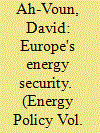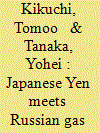| Srl | Item |
| 1 |
ID:
192713


|
|
|
|
|
| Summary/Abstract |
This paper examines the impact of EU energy policies, namely the National Energy and Climate Plans (NECP19) and REPowerEU (2022), on the European natural gas security of supply. Our analysis shows that the REPowerEU plan significantly cuts gas demand by 133 bcm compared to NECP19. This shift can make Europe independent from Russian gas by 2030. Executing REPowerEU requires faster, clean technology deployment. The EU needs to catch up in installations to reach REPowerEU targets, while NECP19 maintains high gas demand (423 bcm till 2030), potentially exacerbating gas import dependence. NECP19 not only raises gas demand but also brings substantial inter-annual variation (IAV) of demand. In cold years (twice in ten years), demand spikes by 39 bcm, and warm years (three in ten years) decrease it by 23 bcm. REPowerEU, while moderately increasing gas demand variation (around 7% versus NECP19), does not solve the demand variability issue. In extremely cold years (one in forty years), Europe may face a 46 bcm gap, around a quarter of the spot LNG market. Failing REPowerEU not only heightens gas import risk but also risks price spikes under varying climates and global market conditions. We offer policy recommendations to address potential price spikes related to IAV demand.
|
|
|
|
|
|
|
|
|
|
|
|
|
|
|
|
| 2 |
ID:
153490


|
|
|
|
|
| Summary/Abstract |
How can Russia and Japan cooperate to contribute to stability and prosperity in the Asia-Pacific region? With 48 trillion cubic meters Russia has the world's largest natural gas reserve while Japan has the world's largest net foreign asset of $3.2 trillion. Linking the two affluent resources creates new transactions and opportunities for the world economy. The implication will be far-reaching beyond the sphere of mere economics and will change the energy and financial world dominated by oil from the Middle East and the USD. For example, Japan imports 82% of its oil from the Middle East--Saudi Arabia (34%), UAE (25%), Qatar (8%), Kuwait (8%), and Iran (5%). On the other hand, the USD is used for 42.09% of international payments and is dominant particularly in Asia where regional currencies such as the Japanese yen (JPY) and the Chinese yuan (CNY) are used only for 3.4% and 1.68% of international payments, respectively.
|
|
|
|
|
|
|
|
|
|
|
|
|
|
|
|
| 3 |
ID:
131218


|
|
|